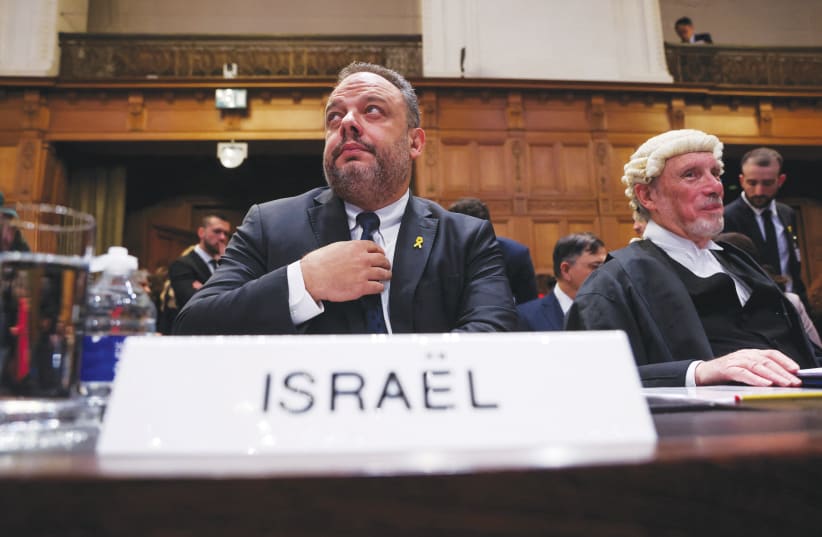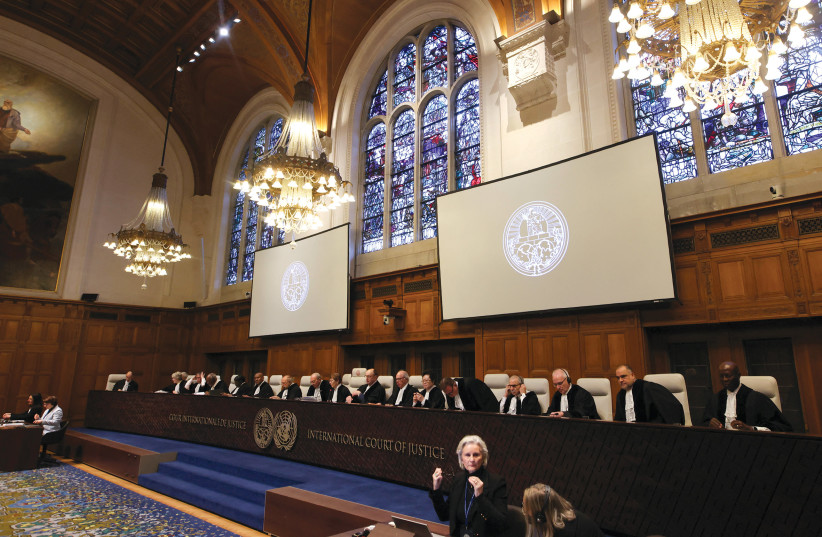by Yonah Jeremy Bob
This was about whether a global sanctions movement against Israel would get a new huge club to wield against the Jewish state.
 |
For 35 minutes, the International Court of Justice bad-mouthed Israel, but then it surprised the Jewish state by not issuing any practical orders against the IDF.
There was no order to cease the war and there was no order for the IDF to withdraw from Gaza.
The most troubling practical item in the ruling for Israel is the need to report back to the ICJ in one month, something which leaves the door open to a more serious order at that time.
All of the other measures that the ICJ ordered are items that Israel says it agrees with in general: don't commit genocide, facilitate humanitarian aid, preserve evidence for probes of alleged war crimes, and prosecute Israelis who engage in illegal incitement against Palestinians.
To understand the complex ICJ decision and why this was a big win for Israel, one needs to understand the difference between declarative and operative law.


Declarative law is basically asking or advising a party to do something but with no teeth.
Only operative law has teeth and punishments.
No definitive action against Israel taken
Israel's critics hoped there would be an order to end the war and withdraw the IDF. They had every right to expect such a result after ICJ declared Israel's West Bank security barrier illegal in 2004 and ordered Israel to remove it.
This would have put Israel in the uncomfortable position of either giving up on its national security to comply or being a public offender of the ICJ's decisions.
This would also have put Israel's allies in a much harder position and possibly led some of them to penalize Israel diplomatically and even economically.
All of this would have had a real-world impact on Israel and the war effort.
Instead, the ICJ heavily criticized Israel for killing Palestinian civilians and causing destruction but avoided any immediate conflagration with Israel.
The one-month time period could also work with US and EU ally positions that the intensity of the war must wind down.
This would not mean that in one month the IDF withdraws or would stop seeking out terrorists.
But Israel could at some point declare that the formal war was over, and that officially IDF activities in Gaza have shifted to more of a law enforcement paradigm closer to what goes on in the West Bank, emphasizing arresting terrorists, and firing on them only in self-defense.
Israel could also leave exceptions for operations relating to eliminating Hamas's leaders and rescuing Israeli hostages, but those would be targeted special operations, not a full-fledged "war."
Another upshot of the decision could be strengthening Attorney-General Gali Baharav-Miara's hand to more aggressively prosecute public officials for incitement against Palestinians.
She can now clearly say she is doing so both to enforce Israeli law and to protect the country from a wave of war crimes allegations and boycotts.
Some Israelis will be furious with the 35 minutes of badmouthing Israel, of treating biased UN officials as neutral, of ignoring the rocket fire on Israel after October 7 (the judges did recognize October 7 as a massacre), of ignoring Israel's massive efforts to evacuate Palestinian civilians and avoid harming them even at the cost of allowing Hamas leaders to escape, and of leaving out Hamas's systematic abuse of hospitals, mosques, schools and all of Gaza as one big human shield.
But that was not what this game was about.
The rhetorical battle was never going to go Israel's way.
This was about whether a global sanctions movement against Israel would get a new huge club to wield against the Jewish state.
And on that issue, Jerusalem just dodged a massive bullet - at least for 30 days.
Yonah Jeremy Bob
Source: https://www.jpost.com/israel-hamas-war/article-783874
No comments:
Post a Comment